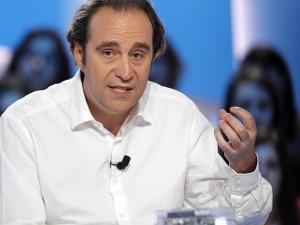‘French Steve Jobs’ shakes up mobile phone market
PARIS – Hailed as the French Steve Jobs, entrepreneur Xavier Niel is shaking up the country’s mobile phone market with a maverick style far removed from France’s traditionally conservative business practices.
A rare business heavyweight not to emerge from the country’s elite universities, Niel started his career in the 1980s operating adult chat services on a French forerunner to the Internet called Minitel.
In 2002 he launched Freeview, a pioneering set-top box that offered combined Internet, telephone and television services at a low-cost – a market benchmark that drove prices down.
Now Niel is taking on mobile phones, offering unlimited calls, messaging and up to three gigabytes of data for 19.99 euros ($26) per month. Another package offers 60 minutes of calls and 60 text messages for two euros per month.
“We are sick and tired of being ripped off with the highest prices in Europe,” Niel said at an event last week clearly inspired by Jobs, the former Apple CEO who died in October.
Wearing an open-necked shirt, strutting across the stage and cheered on by the company’s fans, known as Freenauts, Niel lashed out at traditional French mobile operators and said his company was going to “liberate” consumers.
“This is some much-needed competition coming in to the French market…. They’re obviously trying to shake things up,” said Jessica Ekholm, an analyst with technology research group Gartner.
Gartner’s research shows French consumers pay the most in western Europe for mobile phone services, an average of 392 euros per year, compared with 274 euros in Britain and only 181 euros in Germany.
Free’s website crashed as orders flooded in after the launch. The company has not announced how many users have signed up but Niel said on Friday that subscription rates were “above our expectations”.
All of France’s traditional mobile operators scurried to catch up after the launch, quickly announcing new packages and price cuts.
Market leader Orange offered three new packages of between 9.90 and 24.90 euros per month, followed by providers SFR, owned by Vivendi, Virgin Mobile and Bouygues with similar plans.
“The fact that Free arrived with this price clearly rebooted competition, which was largely absent on the market. Traditional operators were working up to now with a gross margin of 30 to 40 percent,” said Olivier Gayraud of French consumer-rights group CLCV.
Shares in Free’s parent company Iliad hit a 52-week high after the mobile service was launched, boosting Niel’s fortune – already estimated as France’s eighth largest at 2.7 billion euros. He owns about 64 percent of Iliad.
The move also cemented the reputation of a businessman known for bucking the establishment.
Few doubt his businessmen acumen. Before creating Free, he had launched an innovative reverse directory on the Minitel and France’s first Internet provider, WorldNet, which he sold in 2000 for 40 million euros.
But Niel, 44, has also raised eyebrows in the French business world with a series of flamboyant moves, including the joint purchase of newspaper Le Monde despite a bid by President Nicolas Sarkozy to stop him.
He also bought of 50 percent of the rights to the song “My Way”.
Analysts said his latest move is also riskier than it at first appears.
Free is not expected to have a full coverage network of its own until 2018 and in the meantime is renting much of its bandwidth from rival Orange.
And it is only offering the low-cost rate to the first three million subscribers — raising questions about how long it can keep its promise of “freeing” consumers from higher prices.
“This is a pretty strong offering,” Ekholm said. “The question is how long they can go on with it.”
